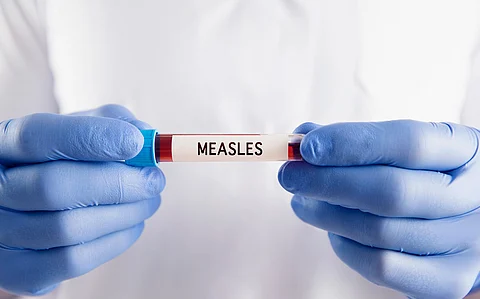

Virologists from the Global Virus Network have raised alarms over a global surge in measles cases, attributing the rise to declining vaccination rates.
The resurgence threatens decades of public health progress, with the US reporting its highest case numbers in 30 years.
The outbreak is exacerbated by weak health systems and interrupted vaccination drives worldwide.
A group of scientists have raised concerns over the alarming and sharp resurgence of measles cases in the United States and around the world.
A coalition of human and animal virologists, collectively a part of Global Virus Network (GVN) from over 40 countries, has said the resurgence is due to declining vaccination rates. This resurgence is eroding public health progress made over the past decades, they added.
Measles, one of the most contagious viruses known to humans, is now spreading across the US. The nation has recently reported the highest number of cases recorded in the past 30 years. There are about 1,300 confirmed cases reported from 40 states this year alone.
In a statement, the GVN said the recent outbreak in Texas is estimated to be the largest since the 1990s and caused deaths of two children and led to hundreds of cases in concentrated areas with weak vaccine reach, such as Gaines County.
It noted that additional clusters have been reported and confirmed from New Mexico, Kansas, Ohio, Kentucky, Pennsylvania and California among others.
“These outbreaks underscore how quickly the virus can spread, especially among unvaccinated children. The US Centers for Disease Control and Prevention (CDC) reports that kindergarten vaccination rates have dropped below 93 per cent nationally during the 2023-2024 school year, while nonmedical exemptions have climbed to a record 3.3 per cent. These figures are below the 95 per cent threshold needed for levels of herd immunity to prevent outbreaks,” the statement said.
The scientists also noted that measles cases are spiking in Africa, Europe and Southeast Asia and exacerbated by war, displacement, weak health systems and interrupted vaccination drives.
The World Health Organization (WHO) and CDC noted that over 10.3 million cases were reported across the world in 2023 from just 10,000 in 2022 — a surge of 30 times.
Nearly half of all major outbreaks were found in Africa. In Europe, 41 of 53 countries on the continent reported confirmed measles cases. The Americas saw an 11-fold hike in cases in early 2025, mainly imported from travellers entering from high-prevalence regions.
Robert Gallo, chairman of the Scientific Leadership Board and co-founder of the GVN, warned that as global travel rebounds post the COVID-19 pandemic, localised outbreaks can quickly transform into international threats.
“This is not just about measles, it’s a warning about what happens when we let our guard down against vaccine-preventable diseases,” he said.
Scientists further warn that complications from measles are not rare. If unvaccinated, 1-3 persons in every 1,000 infected children can die, while many may suffer from pneumonia, severe diarrhoea, encephalitis or deafness. Some children may develop subacute sclerosing panencephalitis — a deadly neurologic condition that can appear years after infection.
Scott Weaver, GVN Center of Excellence Director at The University of Texas Medical Branch and Scientific Director of the Galveston National Laboratory, said every measles outbreak is a failure of public health infrastructure and public trust.
The GVN has urgently called for immediate vaccination of children who remain unvaccinated and adults with safe and effective MMR vaccine to safeguard communities, especially vulnerable populations.
It has also called for public awareness, improved outbreak surveillance and response systems at the local, national and global levels.
Efforts should be focussed on underserved and rural communities, where access and hesitancy pose heightened risks, it added.
“As a network dedicated to pandemic preparedness, the GVN warns that the erosion of routine immunisation not only endangers individual lives but also undermines global capacity to respond to future viral threats,” the scientists concluded.